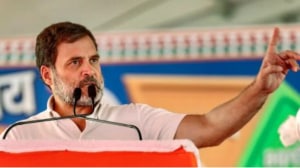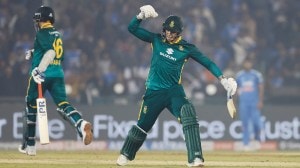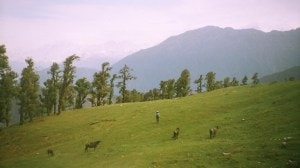Ami Aadu
There is nothing strikingly original about the story. But it is in the telling of it in the language of cinema that makes it outstanding.
Ami Aadu is about a letter addressed to the US President George Bush during Americas attack on Iraq. We see Aadu (Debalina Chatterjee) stick a paper cut-out of Bush into a scrap book. Aadu,a young Hindu Brahmin girl,is writing about her crisis created by the war in Iraq in Bengali. The story moves into flashback. A much younger Aadu lives in a village at Murshidabad. Her mother made her leave school because most of the students are Muslim. She falls in love with a Muslim boy Suleman (Samadarshi Dutta) who dreams of learning very good English and flying abroad with a job. He is disgusted with the acute poverty that his family has to face. His father (Biplab Chatterjee) is a share cropper.
The romance between the young pair captured,amidst the backdrop of the beautiful Murshidabad landscape along the river Padma with Bangladesh on the other side,is both picturesque and emotionally moving. The touches are delicate the English book Suleman has bought falls in the mush in heavy rains and the two laugh it away. In a moving scene we see desire flickering but is kept unfinished. The two riding on a two-wheeler,trekking along in a bus,or sailing across the river on a boat ride are enriched with feather-light touches.
The Hindu-Muslim marriage passes off smoothly. Aadu is accepted warmly by the poor Muslim family. Suleman flies off to Iraq with the help of a village friend (Rudranil Ghosh). He works in a dryfruit shelling factory. On his short visits,he gifts his father with a transistor and his wife with a tape recorder. The tapes build a bridge between them. Once,Suleman records sounds of their love-making to take the tape back with him. When Aadu is angry,he explains that this is his way of feeling close to her in a distant,lonely land.
The narrative returns again and again to a pregnant Aadu writing the unfinished letter. Sulemans sister takes in stitching orders and works on her sewing machine through the night in the dim light of the lantern. Sulemans father pawns off the transistor he is so fond of for a paltry sum. But Aadu buys it back and keeps it secure in her suitcase so that he does not sell it again. When the neighbouring wife tells her how helpful the Americans are towards India,she points out,but they also wage wars.
Suddenly,Sulemans letters,calls from the local STD booth and the tapes stop coming. He disappears without a trace. Then,a letter arrives. Aadu compares the handwriting with his earlier letters and discovers that it has been written with his left hand. She makes the connection Suleman has lost his right arm in the bombing that brought down the factory where he worked and took the life of one of the three friends. When the friend,who took them to Iraq,comes back he confirms her suspicion. Suleman is never seen again except in flashes of Aadus memory,dancing in the rains,calling out to airplanes in flight and raising both arms skywards to express his happiness. Aadu tears off her cut-out of an American soldier and of George Bush,the letter is forgotten. The US-Iraq war is not allowed to occupy centre-stage and is shown only through flashes of violent images on Black-and-White television screens.
Debalina Chatterjees Aadu is mind-blowing in its subtlety,slightly undercut by the dubbed voice. Samadarshi gives her wonderful support. Mithun Chakraborty as Aadus father peeps into his daughters marriage ceremony with a sad face. Bidipta Chakraborty as the neighbouring housewife is very good. Her character is a counterpoint to Aadus situation where,she had to leave a battering husband. Biplab Chatterjee expresses more by his timid expression and body language than dialogue. Soumik Haldars cinematography,Mayukh-Moinaks melodious track without lip-sync songs,Koushik-Bariks production design and Arghya Kamal Mitras editing make Ami Aadu an unforgettable film. There is nothing strikingly original about the story. But it is in the telling of it in the language of cinema that makes it outstanding.
Verdict: ****
Four-star ratingdirection,acting,cinematography and editing.
- 01
- 02
- 03
- 04
- 05































